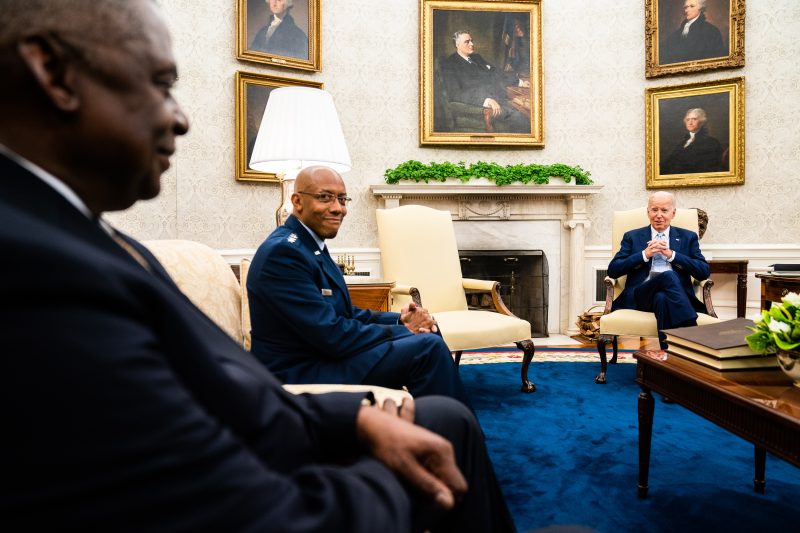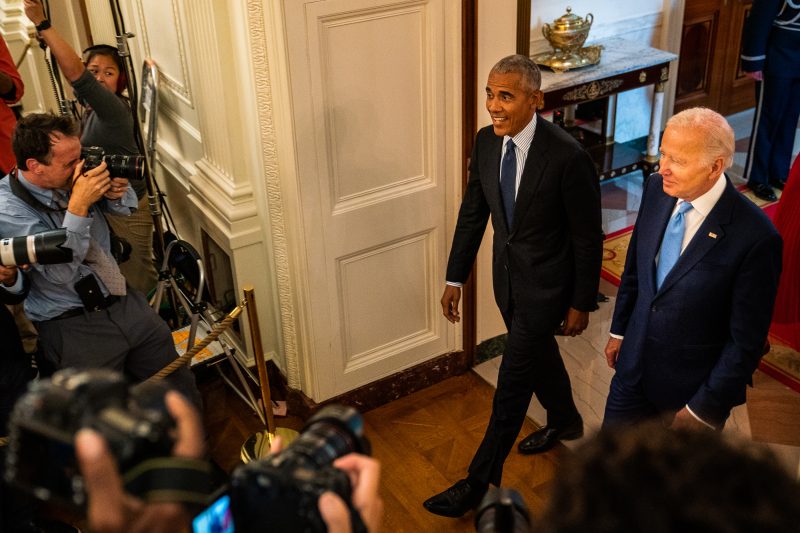White House seeks a path forward on Ukraine amid House turmoil

White House officials are urgently strategizing on the best way to salvage U.S. aid to Ukraine, debating whether to push for a larger funding package or seek a smaller one that may have a better chance of passing now that support for Kyiv in Congress has been thrown into doubt by House Republicans’ ouster of their leader this week.
The removal of Rep. Kevin McCarthy (R-Calif.) as speaker plunged the House of Representatives into turbulent waters, grinding all legislative work to a halt until the deeply fractious GOP can elect a new leader, with some of the candidates openly skeptical of funding Ukraine. President Biden expressed concern Wednesday about what the tumult in the House means for Ukraine aid and said he would be delivering a “major speech” on the issue soon.
“It does worry me,” Biden said. “There are a majority of members of both parties that have said they are for Ukraine aid,” he added, but “the dysfunction always concerns me.”
Biden received a briefing on Ukraine from his national security team on Thursday.
The White House has not yet settled on a new approach to bolstering funding for Ukraine. Much of that strategy will depend on who becomes the next speaker and what kind of deal officials believe they can reach with that person, according to a senior administration official who spoke on the condition of anonymity to discuss internal deliberations.
For now, officials are deciding whether it would be more strategic to pursue a large package that could take them through most of 2024 and avoid having to vote on another supplemental request in a presidential election year, or whether to pursue a smaller, short-term package they may have a better chance of selling to wavering Republicans, according to two senior administration officials.
Some Ukraine advocates inside the administration and on Capitol Hill are pressing for one substantial package to ensure that the war-torn country has the funding it needs for the next year, with the hope that the matter could be tackled again after the presidential and congressional elections in November 2024.
White House officials say that for now they have enough funding authority to meet Ukraine’s urgent battlefield needs, but it is not clear how long that will last. Given the unpredictability in the House, the administration is no longer pursuing the $24 billion supplemental funding request it initially wanted to include into a short-term government funding deal, one of the senior officials said.
McCarthy was seen by the White House as broadly supportive of Ukraine aid, though in a nod to the growing skepticism among Republicans, he had warned against giving a “blank check” to the beleaguered country. One of the leading contenders to replace McCarthy, Rep. Jim Jordan (R-Ohio), is openly opposed to the aid, saying Wednesday he opposes bringing up another Ukraine spending package.
The other leading lawmaker vying for the speakership, Rep. Steve Scalise (R-La.), is considered more supportive — though he, too, would have to respond to the outspoken faction of House Republicans who argue that America should be spending the money at home rather than on a distant conflict.
One senior Pentagon official, speaking on the condition of anonymity because of the sensitivity of the issue, said the administration has significant concerns about both Scalise and Jordan. But Scalise, the official said, “has a history of demonstrable bipartisanship” and recognizes the threat posed by Russia’s aggression, while Jordan has “proven himself time and again” to be a hard-liner difficult to engage on foreign policy issues.
In the Senate, Ukraine is a far more bipartisan issue, as Minority Leader Mitch McConnell (R-Ky.) is a strong supporter of aid to Kyiv.
Many Ukraine advocates want the White House to push for the biggest possible aid package immediately.
“The goal should be to pass enough military aid to cover all of 2024,” said Kurt Volker, who served as the State Department’s special envoy for Ukraine under President Donald Trump. “Twenty-four billion is simply not enough to cover next year, and it is in neither party’s interest to tee up a situation for additional votes during the election campaign.”
But a package of that size would face significant opposition from the conservative bloc of lawmakers who succeeded in stripping Ukraine aid from the recent stopgap funding bill.
“It will be extraordinarily difficult to push a large aid package through the House,” said Dan Caldwell, vice president of the Center for Renewing America, a conservative group that opposes additional funding for Ukraine. “Anyone who has raised concerns about oversight of aid or corruption in Ukraine has been accused of being a Putin apologist, so there is a feeling that aid advocates haven’t always been honest.”
The White House this week launched a multipronged effort to reassure allies in Kyiv and in Europe on Ukraine. Even before McCarthy’s ouster, Biden convened a call with leaders of Canada, Japan and European countries in which he “reaffirmed the United States’ commitment to supporting Ukraine for as long as it takes,” according to a White House summary.
A senior European policymaker who was on the call said that despite nervousness about the situation in Washington, it was “a positive message” for Biden to bring together leaders “to guarantee [U.S.] commitment to Ukraine.”
Administration officials have been in regular contact with their anxious counterparts in Kyiv to tell them the United States remains committed to the war effort. But that has not assuaged Ukrainian concerns over how the White House will overcome the divisions and drama on Capitol Hill, according to several senior administration officials familiar with the conversations.
As of Monday, the Defense Department had congressional authority to transfer $5.4 billion in U.S. military weapons and ammunition to Ukraine, the latest tranche in what has been more than $43 billion in U.S. security assistance since Russia’s invasion in February 2022. The Pentagon has pledged to continue providing weapons as needed, with a recent focus on air defenses, mine clearance and artillery ammunition.
Allies in Kyiv and Europe had begun worrying about whether the United States would maintain its commitment even before the chaotic developments in the House. Just days before House Republicans ousted McCarthy, Congress dropped Ukraine funding from the short-term spending deal that averted a government shutdown, a step that “freaked everyone out” among Ukraine backers in Europe, according to a senior U.S. diplomat posted on the continent.
Still, White House officials had been confident that McCarthy would bring another aid package to a vote. But as House Republicans face a potentially grueling fight over their next speaker, with candidates under pressure to make promises to various party factions, it remains unclear whether the victorious speaker will bring up a funding bill.
When Ukrainian President Volodymyr Zelensky left Washington last month, he was more visibly anxious than he had been in previous meetings with Biden about the future of U.S. support, according to a senior administration official familiar with the meeting who spoke on the condition of anonymity to describe private interactions. Biden assured Zelensky that the United States was committed to standing with Ukraine for as long as it takes — a common refrain of the president — and expressed confidence that Congress would ultimately approve billions more in military and economic assistance.
In their Oval Office meeting, Biden also spoke extensively to Zelensky about corruption in Ukraine, following the publication of a U.S. strategy document saying the problem is a significant threat to the country, according to a person familiar with the meeting. A senior administration official said fighting corruption has long been a priority for Biden and that he did not raise the issue because of a particular scandal or issue.
Some U.S. officials worry that the growing opposition is giving Russian President Vladimir Putin an incentive to wait out the United States until the 2024 election. They see little chance of a diplomatic solution before then, as Putin waits see whether Trump, who has long been relatively sympathetic toward the Russian leader, regains the White House.
“By all indications, Putin has decided he’s not interested in negotiation because he wants to see what happens in 2024, and he has clearly thrown in his lot and his future in the Ukraine war on the possibility of Trump returning to power,” said Ivo Daalder, former U.S. ambassador to NATO under President Barack Obama and president of the Chicago Council on Global Affairs.
Adding to Biden’s political challenge, the war itself has remained largely stagnant for the past year. A highly anticipated Ukrainian counteroffensive has failed to produce significant gains, leaving the two sides in a grinding military slog.
Americans’ support for the war has softened considerably since the invasion a year and a half ago. A survey released Wednesday by the Chicago Council on Global Affairs found that most Americans still support sending additional arms and supplies to the Ukrainians, but the public is more divided over whether the investment has been worthwhile.
Other recent surveys have shown more public skepticism, including a CNN poll in August, which found that 55 percent say Congress should not authorize additional funding to support Ukraine, while 45 percent support additional aid.
Both Biden and Secretary of State Antony Blinken have told their Ukrainian counterparts that they are seeking a way to transition to lower levels of long-term aid that would be more politically sustainable in the United States. That could be accompanied by efforts to rebuild Ukraine’s military-industrial base to make it easier for the country to arm itself, officials said.
Politicians skeptical of the Ukraine effort are also gaining traction outside the United States. In Slovakia, a member of the European Union, former prime minister Robert Fico’s party was the top vote-getter in Saturday elections after he campaigned on a platform of ending aid for Ukraine and starting peace talks between Moscow and Kyiv. Slovakia’s previous government had been among the most aggressive Ukraine backers in Europe.
European policymakers said that as they watch the dynamics in Washington, they realize they may have to shoulder more of the burden.
“It is obvious that if the U.S. hadn’t handed Ukraine the military force and the military support, military tools, Ukraine would not have been able to survive — and we, the E.U. and the rest of the world, should give full credit to the American people for that,” Swedish Foreign Minister Tobias Billstrom said in an interview. “We need to do more in the E.U., in my mind, on the military side. … to match fully the contribution made by the U.S., because this I think is important for keeping credibility in the eyes of the American people.”
Ukrainians, meanwhile, have been warning their partners that they are unlikely to deal Russia a knockout blow anytime soon.
“This war could last for a very long period of time,” Norwegian Foreign Minister Anniken Huitfeldt said in an interview. “This has also been the message from the Ukrainians … They urged us to be realistic. So we should be prepared for that.”
Dan Lamothe contributed to this report.




